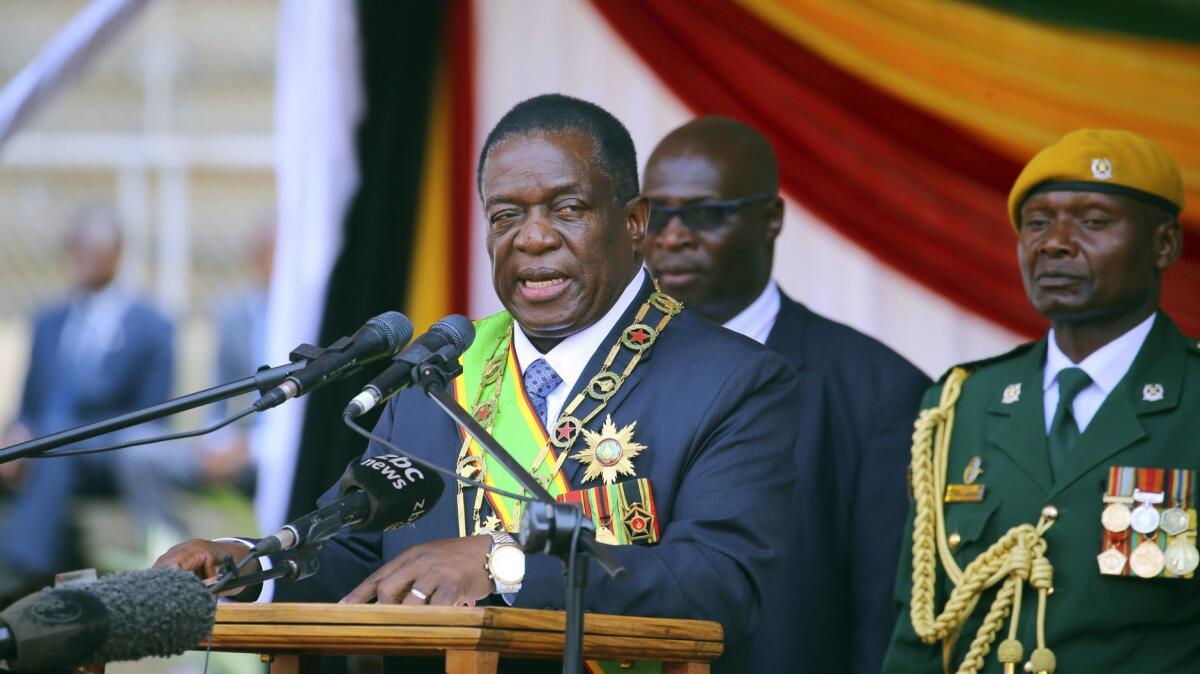Zimbabwe politics is still in turmoil as opposition challenges election results

Reporting from Johannesburg, South Africa — Zimbabwe’s latest experiment in democracy will face another hurdle this week when the opposition goes to court to challenge its loss in last month’s presidential election — a contest the opposition says was tainted by fraud.
The court hearing Wednesday will unfold in rare televised proceedings that will be watched closely — and face unprecedented scrutiny — from around the world.
For nearly two weeks, Zimbabweans have been in limbo after opposition leader Nelson Chamisa launched a legal challenge to the electoral commission’s official results that awarded him 44.3% of the vote to President Emmerson Mnangagwa’s 50.8% in July 30 polls. The rest of the votes were divvied up among another 21 candidates.
Chamisa says he won the popular vote and has accused the government of doctoring the results in favor of Mnangagwa, a long-time ally of former president Robert Mugabe who stepped into the presidency after Mugabe was forced to resign in November.
The historic elections, widely seen as a chance for the beleaguered nation to restore its democratic credentials after 37 years of Mugabe’s increasingly autocratic rule, prompted a record number of voters to cast their ballots on a largely peaceful voting day.
But that optimism was stamped out less than 48 hours later, when the army launched a violent crackdown on opposition protesters, opening fire on demonstrators and bystanders and killing six people. In the days that followed, dozens of opposition supporters and activists were arrested, harassed and beaten up by security forces, opposition leaders and human rights groups say.
Now millions of Zimbabweans wait to see whether any resolution is in sight as the opposition Movement for Democratic Change alliance and the ruling ZANU-PF go to court, after months of campaign promises by both parties to fix the broken economy and create desperately needed jobs.
The Constitutional Court can declare a winner, nullify the results and call for a new election, or issue another directive, such as calling for a runoff if it decides neither candidate secured a clear majority. It has until near the end of the month to make a ruling.
Though some members of the opposition have said the bid may fail, both parties’ leadership have said in recent days that they are confident of their cases, raising the specter of further unrest once the court announces its decision.
Many Zimbabweans believe the country’s judges are sympathetic to the ruling party, though the courts have historically demonstrated some independence, said Piers Pigou, a senior consultant with the International Crisis Group, a Brussels-based organization dedicated to preventing conflicts.
“This is a real test for the courts to demonstrate their prowess and independence,” he said. “It’s a very fragile situation.”
Unusually, the court proceedings will be televised by the Zimbabwe Broadcasting Corp., the state broadcaster that was roundly criticized by international election monitors for biased coverage in the run-up to the vote.
MISA Zimbabwe, a group advocating freedom of expression, also asked to have the hearing livestreamed on social media to reach more viewers, but the court dismissed the request Tuesday.
Nevertheless, regional media watchdogs say the fact that the proceedings will be televised at all is a good thing.
“It means the judges themselves are going to be under massive scrutiny,” said William Bird, director of Media Monitoring Africa, a South Africa-based group.
“Once you go down the route of broadcasting [proceedings], you’ve got to do it. If you try to censor it, people aren’t stupid. They’re going to sense it in a heartbeat.”
Mahr is a special correspondent.
More to Read
Sign up for Essential California
The most important California stories and recommendations in your inbox every morning.
You may occasionally receive promotional content from the Los Angeles Times.










